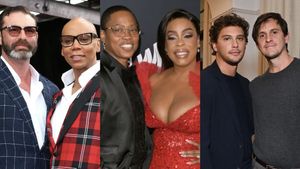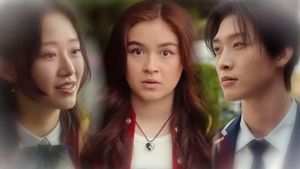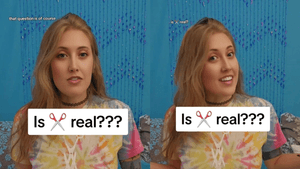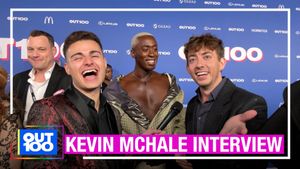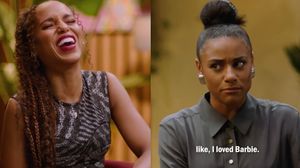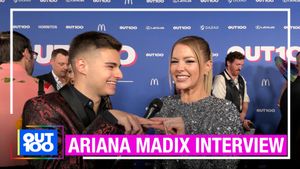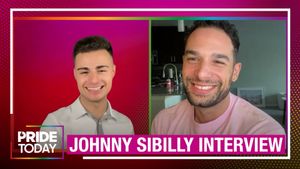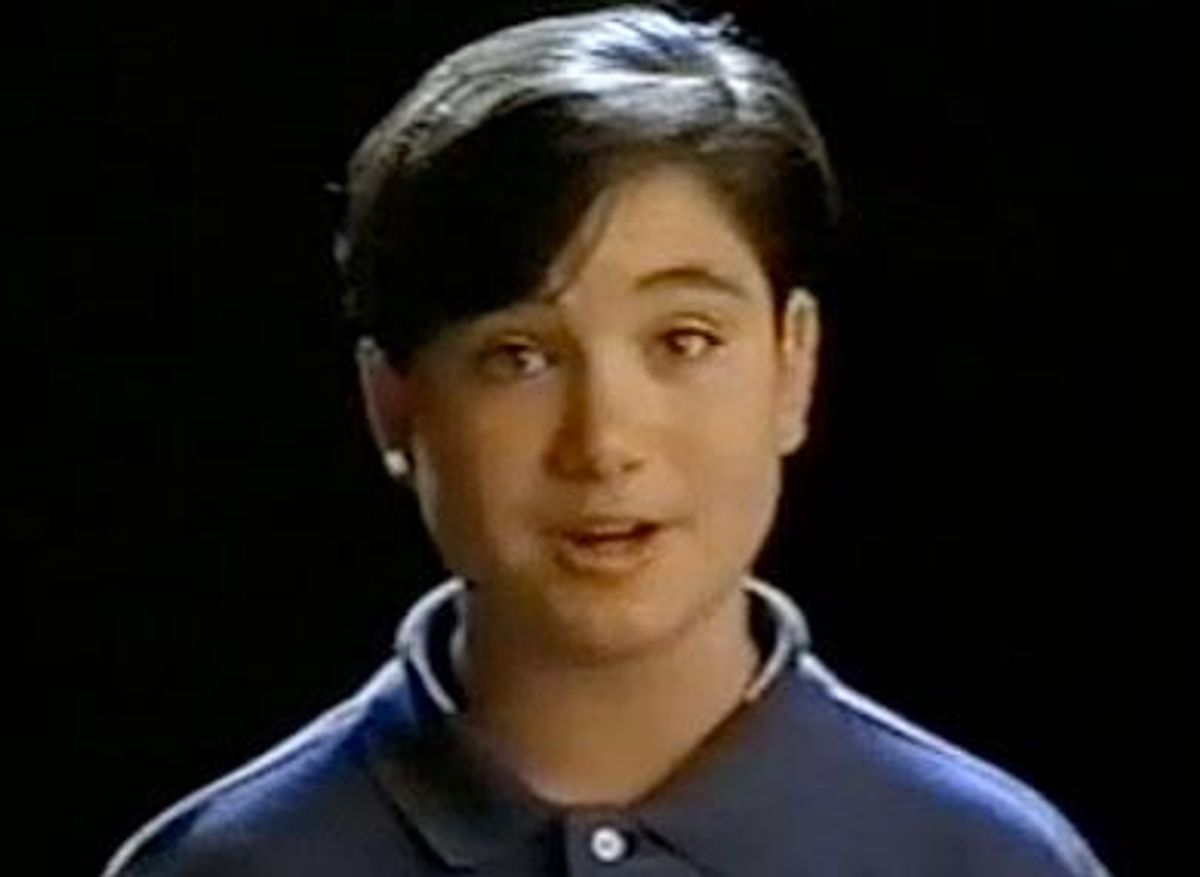
CONTACTStaffCAREER OPPORTUNITIESADVERTISE WITH USPRIVACY POLICYPRIVACY PREFERENCESTERMS OF USELEGAL NOTICE
© 2024 Pride Publishing Inc.
All Rights reserved
All Rights reserved
By continuing to use our site, you agree to our Private Policy and Terms of Use.
Trevor, a short film from 1994, follows a flamboyant, Diana Ross-obsessed teenager (memorably played by Brett Barsky) who, after realizing he's gay and being ostracized by his friends, attempts suicide. While recovering in the hospital, Trevor meets a gay teenage candy striper who encourages him to live.
The humorous, affecting film (written by James Lecesne and produced by Randy Stone, and Peggy Rajski, who also directed) touched an emotional chord with viewers who related to the universal story of an outsider looking for acceptance. Trevor won numerous awards, including an Oscar for best live action short film. Its greatest impact, however, was motivating its filmmakers to found The Trevor Project, a round-the-clock suicide prevention helpline for LGBTQ teens.
Barsky, who is straight, works behind the scenes in the entertainment industry and is the married father of two daughters, speaks with The Advocate about the making of the film, its legacy, and offers advice for gay teens.
The Advocate: How did you get cast as Trevor?
Brett Barsky: I auditioned for it in New York. At first my parents were a bit leery because it was a gay character and I was 12 going on 13, but I auditioned for it. The casting director called my mother in and she gave her the script and asked me to come back and meet with the director in two weeks. I went back and met Peggy Rajski and auditioned for her and got a second callback with Peggy and Randy Stone and James Lecesne. They offered me the part right there.
Did your parents have a discussion with you about playing a gay character at such a young age?
Yes. First they wanted me to be aware of what being gay was. I kind of had an idea, but I got the whole sex talk during that period before I filmed the movie. My parents told me that people are different and you have to respect who everyone is. That's how I understood it.
As a straight teenager did you have any reservations about playing such a flamboyant character?
No. My parents read the script and decided there was nothing wrong for a 13-year-old to do. There was no nudity and nothing graphic. It was innocent, for the most part.
How did you rehearse the Diana Ross impersonations?
[Laughs] I rented her films Lady Sings the Blues, Mahogany, and The Wiz. So basically watching those movies and listening to songs by The Supremes is how I trained for it. For my second callback I sang "Stop! In the Name of Love." That's on tape somewhere out there.
Tell me what you recall about the making of the film.
It took
about a week and a half. They flew me to California, and it was the
first time I'd gotten to work out there. Everyone in the cast was
excited about the film. I don't think anyone got paid for it, but
everyone was really happy to be making something they felt was so
important.
What do you remember about the response to the film at the time?
When I saw the film for the first time at a screening in California. My mother and I were there for the screening and we sat in the back and people were coming up to me. I didn't expect any of this, but people just loved the movie. At 13 I didn't realize the impact it could have, and what it could mean to people has grown on me over time.
Did people who saw the film confuse you with Trevor?
Yes. I got picked on a lot. People said "If you're playing a gay character, you must be gay." People would just assume I'm gay.
Watch Trevor below. Continued on next page.
How did your friends react?
I had a close group of friends that turned on me because I made the film. I started acting when I was 9 and even before I played Trevor, I would get teased for going to auditions, because I wasn't out playing baseball. When Trevor came out there was more and more teasing and it got worse. It just spiraled. It's not a good thing to deal with.
How did you handle the pressure?
I just wouldn't talk to the people who were teasing me. I just stood away from the negativity. And there were always people who were supportive, as well.
What do you remember about the late Randy Stone, who produced the film?
Randy was a really great guy. I met him on the second call back and he offered me the part. The next time I met him was when we were in California shooting the film. He told my mother the film was going to win an Oscar. Everyone was like, "What are you talking about?" We hadn't even filmed it yet. But he said, "Brett's going to give an amazing performance and the movie is going to be really good and win an Oscar." My mother laughed it off. Then we got a phone call a few months later saying it had been nominated. Randy was always supportive. Actually a week before he passed away I reconnected with him by e-mail and then found out a week later he'd died. It was horrible.
Did you pursue an acting career after the film?
Yes, I'm still trying here and there. I've done a lot of voiceovers. I did a voice in Grand Theft Auto Four. It's hard to audition with a family. It's like gambling to get on a bus, go to an audition for 10 minutes. Sometimes you'll hear something and sometimes you don't hear anything at all.
You're married with two daughters. What would you say if one of them told you she's gay?
I would absolutely accept it. I love my daughters very much and I'm there 100 % for them. I'd tell them to be careful and stay open-minded. People will say things you won't like but don't listen to them. There's always something better than what they're saying.
How does it feel to have been involved in a project that has such an enduring legacy?
I feel that if Trevor helped one person not commit suicide then I did my job. There are so many people who use The Trevor Project. It's really important. In the last few weeks it's become more apparent. No kids should go through what these kids have gone through. They need to understand that there are other people out there like them and know that there are people out there for them and they can get the support they need.
Watch Barsky's "It Gets Better" video below.
From our Sponsors
Most Popular
31 Period Films of Lesbians and Bi Women in Love That Will Take You Back
December 09 2024 1:00 PM
18 of the most batsh*t things N.C. Republican governor candidate Mark Robinson has said
October 30 2024 11:06 AM
True
After 20 years, and after tonight, Obama will no longer be the Democrats' top star
August 20 2024 12:28 PM
Trump ally Laura Loomer goes after Lindsey Graham: ‘We all know you’re gay’
September 13 2024 2:28 PM
Melania Trump cashed six-figure check to speak to gay Republicans at Mar-a-Lago
August 16 2024 5:57 PM
Latest Stories
Gayest moments in Sabrina Carpenter's 'A Nonsense Christmas' special
December 17 2024 9:18 PM
Tammy Baldwin, 20 other senators try to strike anti-trans provision from defense bill
December 17 2024 6:46 PM
Montana court blocks enforcement of ban on gender marker changes
December 17 2024 5:07 PM
No, the Wisconsin school shooter wasn’t transgender
December 17 2024 4:46 PM
Angie Craig elected first woman and first LGBTQ+ ranking member of House Agriculture Committee
December 17 2024 4:21 PM
Florida Republican wants to ban Pride flags in public buildings
December 17 2024 1:59 PM
To this pro men's tennis player, coming out was 'so normal that I didn’t think about it'
December 17 2024 1:28 PM
Toni Atkins on running to become California's first lesbian governor (exclusive)
December 17 2024 12:24 PM



































